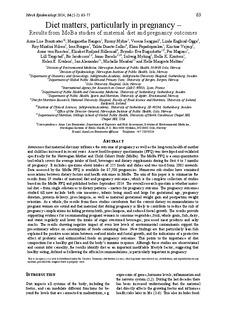| dc.contributor.author | Brantsæter, Anne Lise | |
| dc.contributor.author | Haugen, Margaretha | |
| dc.contributor.author | Myhre, Ronny | |
| dc.contributor.author | Sengpiel, Vernea | |
| dc.contributor.author | Englund-Ögge, Linda | |
| dc.contributor.author | Nilsen, Roy Miodini | |
| dc.contributor.author | Borgen, Iren | |
| dc.contributor.author | Duarte-Salles, Talita | |
| dc.contributor.author | Papdopoulou, Eleni | |
| dc.contributor.author | Vejrup, Kristine | |
| dc.contributor.author | Von Ruesten, Anne | |
| dc.contributor.author | Hillesund, Elisabet Rudjord | |
| dc.contributor.author | Birgisdottir, Bryndis Eva | |
| dc.contributor.author | Magnus, Per | |
| dc.contributor.author | Trogstad, Lill | |
| dc.contributor.author | Jacobsson, Bo | |
| dc.contributor.author | Bacelis, Jonas | |
| dc.contributor.author | Myking, Solveig | |
| dc.contributor.author | Knutsen, Helle K. | |
| dc.contributor.author | Kvalem, Helen E. | |
| dc.contributor.author | Alexander, Jan | |
| dc.contributor.author | Mendez, Michelle | |
| dc.contributor.author | Meltzer, Helle Margrete | |
| dc.date.accessioned | 2015-02-20T07:59:47Z | |
| dc.date.available | 2015-02-20T07:59:47Z | |
| dc.date.issued | 2014 | |
| dc.identifier.citation | Brantsæter, A. L., Haugen, M., Myhre, R., Sengpiel, V., Englund-Ögge, L., Nilsen, R. M., . . . Meltzer, H. M. (2014). Diet matters, particularly in pregnancy : results from MoBa studies of maternal diet and pregnancy outcomes. Norsk Epidemiologi, 24(1-2), 63-77. | nb_NO |
| dc.identifier.issn | 0803-2491 | |
| dc.identifier.uri | http://hdl.handle.net/11250/276819 | |
| dc.description | Published version of an article in the journal: Norsk Epidemiologi. Also available from the publisher at: http://www.ntnu.no/ojs/index.php/norepid/article/view/1805/1802 Open Access | nb_NO |
| dc.description.abstract | Awareness that maternal diet may influence the outcome of pregnancy as well as the long-term health of mother and child has increased in recent years. A new food frequency questionnaire (FFQ) was developed and validated specifically for the Norwegian Mother and Child Cohort Study (MoBa). The MoBa FFQ is a semi-quantitative tool which covers the average intake of food, beverages and dietary supplements during the first 4 to 5 months of pregnancy. It includes questions about intakes of 255 foods and dishes and was used from 2002 onwards. Data assessed by the MoBa FFQ is available for 87,700 pregnancies. Numerous sub-studies have examined associations between dietary factors and health outcomes in MoBa. The aim of this paper is to summarize the results from 19 studies of maternal diet and pregnancy outcomes, which is the complete collection of studies based on the MoBa FFQ and published before September 2014. The overall research question is whether maternal diet – from single substances to dietary patterns – matters for pregnancy outcome. The pregnancy outcomes studied till now include birth size measures, infants being small and large for gestational age, pregnancy duration, preterm delivery, preeclampsia, as well as maternal gestational weight gain and postpartum weight retention. As a whole, the results from these studies corroborate that the current dietary recommendations to pregnant women are sound and that maternal diet during pregnancy is likely to contribute to reduce the risk of pregnancy complications including preterm birth, preeclampsia, and reduced foetal growth. The results provide supporting evidence for recommending pregnant women to consume vegetables, fruit, whole grain, fish, dairy, and water regularly and lower the intake of sugar sweetened beverages, processed meat products and salty snacks. The results showing negative impact of even low levels of environmental contaminants support the precautionary advice on consumption of foods containing these. New findings are that particularly lean fish explained the positive association between seafood intake and foetal growth, and the indications of a protective effect of probiotic and antimicrobial foods on pregnancy outcomes. This points to the importance of diet composition for a healthy gut flora and the body’s immune response. Although these studies are observational and cannot infer causality, the results identify diet as an important modifiable lifestyle factor, suggesting that healthy eating, defined as following the official recommendations, is particularly important in pregnancy. | nb_NO |
| dc.language.iso | eng | nb_NO |
| dc.publisher | Norsk forening for epidemiologi | nb_NO |
| dc.title | Diet matters, particularly in pregnancy : results from MoBa studies of maternal diet and pregnancy outcomes | nb_NO |
| dc.type | Journal article | nb_NO |
| dc.type | Peer reviewed | nb_NO |
| dc.subject.nsi | VDP::Medical disciplines: 700::Health sciences: 800::Nutrition: 811 | nb_NO |
| dc.source.pagenumber | 63-77 | nb_NO |
| dc.source.volume | 24 | nb_NO |
| dc.source.journal | Norsk Epidemiologi | nb_NO |
| dc.source.issue | 1-2 | nb_NO |
